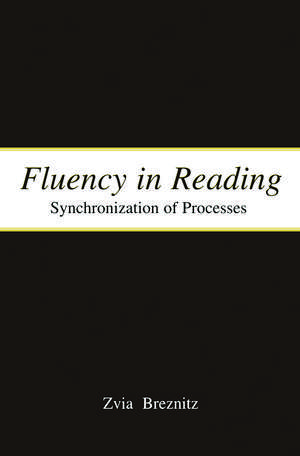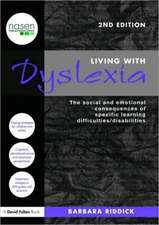Fluency in Reading: Synchronization of Processes
Autor Zvia Breznitzen Limba Engleză Paperback – 9 iul 2013
Part I explains fluency in reading from both traditional and modern perspectives. Fluency has historically been viewed as the outcome of other reading-related factors and has often been seen as a convenient measure of reading skills. This book, however, argues that fluency has a strong impact on other aspects of reading and plays a central role in the entire reading process.
Part II deals with the determinants of reading fluency. Chief among these is the speed of information processing in the brain. Using both behavioral and electrophysiological evidence, the book systematically examines the features of processing speed in the various brain systems involved in reading: visual-orthographic, auditory-phonological, and semantic and shows how speed of processing affects fluency in reading.
Part III deals with the complex issues of cross-modal integration and specifically with the need for effective synchronization of the brain processes involved in reading. It puts forward the Synchronization Hypothesis and discusses the role of the Asynchrony Phenomenon as a major factor in dyslexia. Finally, it summarizes research on manipulating reading rate by means of the Acceleration method, providing evidence for a possible intervention aimed at reducing Asynchrony.
Key features of this outstanding new book include:
*Expanded View of Fluency. Reading fluency is seen as both a dependent and an independent Variable. Currently available books focus on reading rate solely as the outcome of other factors whereas this volume stresses that it is both an outcome and a cause.
*Information Processing Focus. Fluency itself is determined to a large extent by a more general factor, namely, speed of processing in the brain. The book presents wide-ranging evidence for individual differences in speed of processing across many subpopulations.
*Brain Synchronization Focus. The book posits a new theory arguing that effective reading requires synchronization of the different brain systems: visual orthographic, auditory-phonological, and semantic.
*Research-Based Interventions. Interventions to enhance fluency and, thereby, reading skills in general are presented in detail.
*Author Expertise. Zvia Breznitz is Head of the Department of Learning Disabilities and Director of the Laboratory for Neurocognitive Research at Haifa University in Israel, where she has been researching this topic for over a decade.
This book is appropriate for researchers and advanced students in reading, dyslexia, learning disabilities, cognitive psychology, and neuropsychology.
Preț: 478.55 lei
Nou
Puncte Express: 718
Preț estimativ în valută:
91.58€ • 99.44$ • 76.93£
91.58€ • 99.44$ • 76.93£
Carte tipărită la comandă
Livrare economică 22 aprilie-06 mai
Preluare comenzi: 021 569.72.76
Specificații
ISBN-13: 9780415647823
ISBN-10: 0415647827
Pagini: 328
Dimensiuni: 152 x 229 x 15 mm
Greutate: 0.36 kg
Ediția:1
Editura: Taylor & Francis
Colecția Routledge
Locul publicării:Oxford, United Kingdom
ISBN-10: 0415647827
Pagini: 328
Dimensiuni: 152 x 229 x 15 mm
Greutate: 0.36 kg
Ediția:1
Editura: Taylor & Francis
Colecția Routledge
Locul publicării:Oxford, United Kingdom
Public țintă
ProfessionalCuprins
Contents: Preface. Fluency in Reading: Approaches and Definitions. Reading Rate. Automaticity in Fluent Reading. Prosody as an Indication of Fluency. Naming Speed: A Review. Speed of Processing. Visual Processing: Regular and Dyslexic. Auditory-Phonological Processing: Regular and Dyslexic. Speed of Processing of Visual and Auditory Modalities: Research Evidence. Event-Related Potentials (ERPs) in the Study of Dyslexia. Cross Modal Integration. The Synchronization Phenomenon. Reading Fluency, Training, and Dyslexia. Conclusion: The Key Role of SOP Within the Orchestration of Reading.
Recenzii
"This volume is a great resource for understanding the underlying neurological processes involved in reading fluently. It is clearly written and is an extensive review of the available literature. The author shows how interventions with dyslexic readers improve their reading fluency by targeting the brain pathways that work for non dyslexic readers. Recommended. Upper-division undergraduates through practitioners."
—CHOICE
"Without a doubt the greatest strength of this project is the long history of superb research Dr. Breznitz has conducted in the area of fluency. Indeed, her investigations in fluency predated by many years the current vogue that fluency research now enjoys. As a reading researcher and cognitive neuroscientist, I welcome such a promising addition to the field and will certainly purchase a copy myself."
—Maryanne Wolf
Tufts University
"I find this book to be refreshingly complete, covering the range of theoretical, empirical, and practical issues that are so often underrepresented in books of this nature. In particular, I think the author's plan to sort out the relationship between phonological processing and fluency will be a particularly important contribution."
—David Chard
University of Oregon
—CHOICE
"Without a doubt the greatest strength of this project is the long history of superb research Dr. Breznitz has conducted in the area of fluency. Indeed, her investigations in fluency predated by many years the current vogue that fluency research now enjoys. As a reading researcher and cognitive neuroscientist, I welcome such a promising addition to the field and will certainly purchase a copy myself."
—Maryanne Wolf
Tufts University
"I find this book to be refreshingly complete, covering the range of theoretical, empirical, and practical issues that are so often underrepresented in books of this nature. In particular, I think the author's plan to sort out the relationship between phonological processing and fluency will be a particularly important contribution."
—David Chard
University of Oregon
Descriere
This is the first book to examine in-depth the crucial role of the speed of information processing in the brain in determining reading fluency in both normal and dyslexic readers. Part I explains fluency in reading from both traditional and modern perspe














